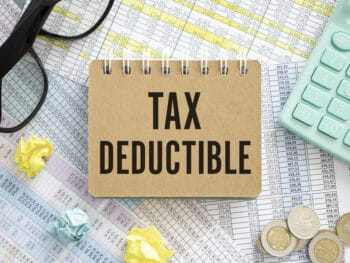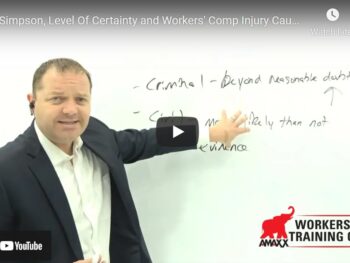Workers compensation rules and regulations vary from state to state. With that said, do you know how workers comp is run in New Jersey?
Click Link to Access Free PDF Download
“Avoid the 3 Primary Reasons Injured Workers’ Hire Attorneys”
If you are a New Jersey business owner with independent contractors under your wing, you are not mandated to offer workers comp insurance, though a sizable number of individual independent contractors who would not be looked upon as employees in other states will be thought of as an employee in New Jersey.
If the employer retains the right to decide what should be done and how it will be taken care of, or if the work that is done by the independent contractor is a key part of the activities of the business, New Jersey will look upon the individual as an employee.
Obtaining Coverage in New Jersey
In order to receive comp coverage in the Garden State, there are two options for employers:
- Acquiring a comp policy through an insurer with authority to conduct business in the state;
- Receiving approval from the New Jersey Commissioner of the Department of Banking and Insurance to serve as an independent self-insurer, along with the posting of security if requested Governmental agencies in New Jersey must carry compensation insurance, but are not required to obtain it from an authorized insurer or to be self-insured. They can take part in a governmental insurance pool, or they can maintain a separate appropriation for workers comp.
Reporting a Claim
In those instances when a claim must be reported, the injured worker is required to report the incident to his or her boss within three months of the injury.
The notice of injury may be passed on to the employees’ supervisor, personnel team or any worker that holds an authoritative position at the company.
Upon hearing of the injury, the company must report the comp claim to the insurer at once. At that point, the insurance company must file the First Report of Injury form with the New Jersey Division of Workers Compensation within 21 days of the of obtaining claim notification.
How Medical Benefits Are Determined
In order for medical benefits to move through, the business owner chooses the medical provider.
In the event the employer turns down providing medical treatment, the employee is allowed to choose the medical provider. In an emergency scenario, the employee may receive treatment at any emergency care facility or the emergency room of a hospital without the employers’ approval.
Once the initial emergency care has been completed, the employee must treat with the employer’s selected medical provider. All reasonable and required medical treatment including prescriptions and hospitalization are provided and approved under New Jersey’s workers comp statutes for as long as the employee needs medical treatment.
Dealing with Temporary Total Disability Benefits
When it comes to temporary total disability (TTD) benefits, these are calculated as 70 percent of the employees’ average weekly wage, not to go beyond the statutory maximum rate or to drop beneath the statutory minimum rate.
There is no annual cost of living adjustment for accidents after Jan. 1, 1980. The maximum amount and minimum amount of TTD benefits is altered regularly by the Commissioner of Labor and Workforce Development.
The initial seven days of disability (the waiting period) is not paid to the injured employee unless the worker finds themselves disabled for more than a week. TTD benefits can be paid until the employee returns to his or her job, or reaches maximum medical improvement, or for a maximum of 400 weeks. Permanent
Dealing with Partial Disability Benefits
New Jersey employees are paid permanent partial disability (PPD) benefits for any permanent loss of body function that is the result of an on-the-job injury.
Once the employee has gotten to the point of “permanent and stationary” (maximum medical improvement), the employee is paid PPD weekly and PPD is paid after TTD benefits have concluded.
The Garden State utilizes a Schedule of Disabilities when it comes to injuries for arms, legs, hands, feet, fingers, toes, vision and hearing. The loss of an arm amounts to 330 weeks of indemnity benefits. The number of weeks of indemnity benefits drops to the loss of a small toe being worth 15 weeks of indemnity benefits (with a week calculated the same as TTD).
Injuries to the back, heart and lungs are not scheduled injuries. When a New Jersey worker is dealing with a non-scheduled injury, they will continue to gather TTD benefits, up to 600 weeks or until they are able to go back to their job.
Case for Permanent Total Disability Benefits
New Jersey permits the worker to receive 450 weeks of indemnity benefits when the employee can’t return to any form of gainful employment.
Benefits can be continued conditionally past the point of the 450 weeks provided the employee has agreed to the prescribed rehabilitation and can show that she/he remains totally disabled.
The permanent total disability benefits are paid weekly, based upon 70% of the employees’ average weekly wage, not to exceed the state maximum or to drop beneath the state minimum.
Looking in at Death Benefits
The burial costs in the Garden State are covered for a work-related death up to $3,500. If there is one beneficiary, the death benefits equal 50% of the deceased employee’s average weekly wage.
In the case of each additional beneficiary, an added 5% is included up to a maximum of 70%, but not to surpass the maximum weekly benefit rate. The death benefits are payable to a surviving spouse, or spouse and children, or any other member of the family who is able to prove dependency upon the deceased employee.
A judge for the Department of Labor and Workforce Development will oversee a hearing to decide how the death benefits are divided by the dependents.
Children are defined as being under the age of 18, or under the age of 23 if enrolled full time in an accredited educational institution. A surviving spouse obtains the death benefit for life until the surviving spouse remarries.
An Overview of Vocational Rehabilitation
New Jersey employees’ permanent total disability benefits are referred to the New Jersey Division of Vocational Rehabilitation at the 450 week mark.
Permanent total disability benefits may be halted unless the worker has taken part in physical or educational retraining as mandated by the Division of Vocational Rehabilitation.
Permanent total disability benefits will continue if the Division of Vocational Rehabilitation certifies the employee is in fact fully disabled.
Author Michael B. Stack, CPA, Principal, Amaxx Risk Solutions, Inc. is an expert in employer communication systems and part of the Amaxx team helping companies reduce their workers compensation costs by 20% to 50%. He is a writer, speaker, and website publisher. www.reduceyourworkerscomp.com. Contact: mstack@reduceyourworkerscomp.com.
©2014 Amaxx Risk Solutions, Inc. All rights reserved under International Copyright Law.
WORK COMP CALCULATOR: http://www.LowerWC.com/calculator.php
MODIFIED DUTY CALCULATOR: http://www.LowerWC.com/transitional-duty-cost-calculator.php
WC GROUP: http://www.linkedin.com/groups?homeNewMember=&gid=1922050/
SUBSCRIBE: Workers Comp Resource Center Newsletter
Do not use this information without independent verification. All state laws vary. You should consult with your insurance broker, attorney, or qualified professional.























What NJ Workers Compensation statute states that; sole proprietors do not need to cover the principal owner? You stated above that the workers are required, but implied that the principal owner does not need to be covered.